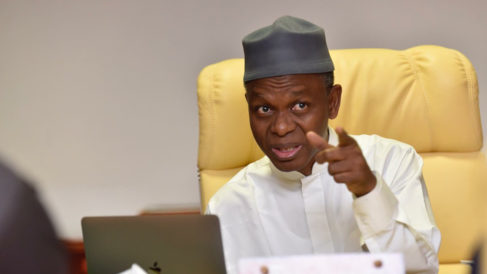Gov. Nasir El-Rufai loves to flaunt his appointment of “non-indigenes” in his government as evidence of his broadmindedness. I know at least 5 top appointees of his who are not—and have never claimed to be—from Kaduna State. In fact, his senior media aide is—or used to be—a Yoruba man. Yet during a recent rabble-rousing speech at a campaign rally in Kaduna, he called into question the “indigeneity” of all 3 senators from his state—in addition to imploring his supporters to visit violence on the senators when they set feet on the state. (The governor has shown himself, time and again, to be a violence-prone, flame-throwing, brain-damaged gubernatorial thug, so no surprises there.)
In an ironic twist, nevertheless, there is a longstanding whispering campaign in Kaduna to the effect that El-Rufai’s ancestors aren’t native to Kaduna. When I wrote my well-received series on Nigeria’s ethnic complexities and interconnectedness last year—and many years earlier— I received several emails from people who pointed to El-Rufai as another example of someone who is subsumed in what I termed “ecumenical ethnicity,” which I associated exclusively with Hausa. “This kind of ethnic project is, to a large extent, all-embracing, provided people internalize certain core cultural assumptions and practices of the original ethnic group,” I wrote.
Several people wrote to say that El-Rufai’s ancestors were Ebira from what is now Kogi State and that he is one of the “beneficiaries” of Hausa ethnicity’s ecumenicality. (El-Rufai self-identifies as Fulani). I didn’t publish the letters or included the information in my series for two reasons. One, the first sets of names I gave to make my case years ago—such as former Sokoto State governor Abdulkareem Yahya (said to be descended from Yoruba ancestors), Alhaji Tanko Yakassai (said to be descended from Jukun ancestors), etc.—pushed back strongly against my claims. Two, I asked several of my Zaria friends about El-Rufai’s paternal ancestral provenance and they could neither confirm nor deny his putative Ebira ethnicity.
But our ethnic and geographic identities are mere accidents. Our primordial identities aren’t just accidents; they are also incidental to our humanity. It’s disappointing that a state governor would choose to delegitimize his state’s representatives in the Senate by calling attention to their supposed “foreignness” while taking credit for having a mind broad enough to appoint “foreign” people in his government.

